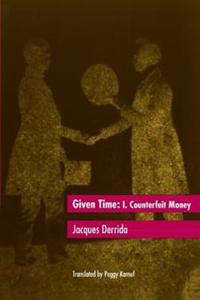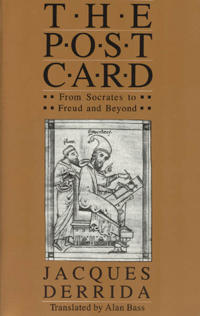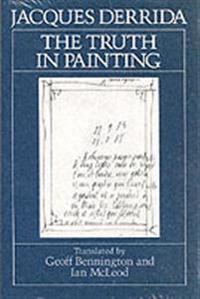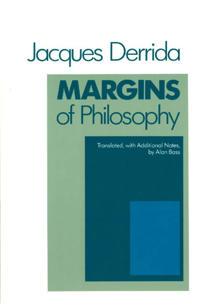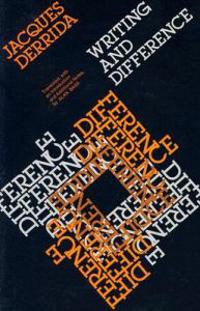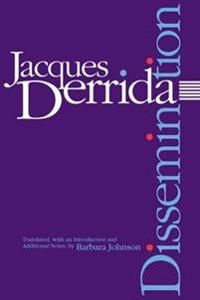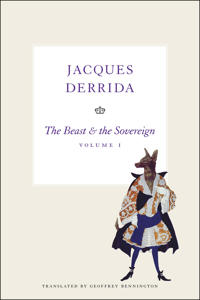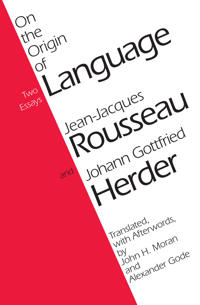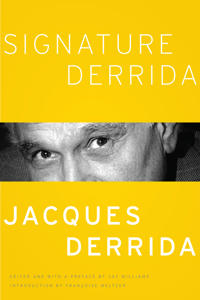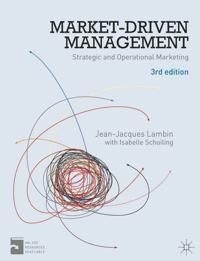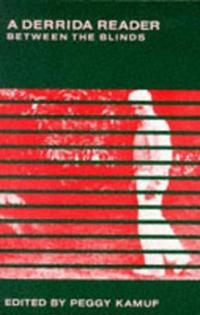Given Time (Häftad)
avJacques Derrida
ISBN: 9780226143149 - UTGIVEN: 199406Is "giving" possible? Is it possible to give without immediately entering into a circle of exchange that turns the gift into a debt to be returned? This question leads Jacques Derrida to make out an irresolvable paradox at what seems the most fundamental level of the gift's meaning: for the gift to [...]
Of Spirit (Pocket)
avJacques Derrida, Geoffrey Bennington, Rachel Bowlby
ISBN: 9780226143194 - UTGIVEN: 199104"Will a more important book on Heidegger appear in our time? No, not unless Derrida continues to think and write in his spirit. . . . Let there be no mistake: this is not merely a brilliant book on Heidegger, it is thinking in the grand style."--David Farrell Krell,; IResearch in Phenomenology; X[...]
The Postcard (Häftad)
avJacques Derrida
ISBN: 9780226143224 - UTGIVEN: 198706You were reading a somewhat retro loveletter, the last in history. But you have not yet received it. Yes, its lack or excess of address prepares it to fall into all hands: a post card, an open letter in which the secret appears, but indecipherably. You can take it or pass it off, for examplle, as a [...]
The Truth in Painting (Häftad)
avJacques Derrida
ISBN: 9780226143248 - UTGIVEN: 1987-07"The four essays in this volume constitute Derrida's most explicit and sustained reflection on the art work as pictorial artifact, a reflection partly by way of philosophical aesthetics (Kant, Heidegger), partly by way of a commentary on art works and art scholarship (Van Gogh, Adami, Titus-Carmel).[...]
Margins of Philosophy (Inbunden)
avJacques Derrida
ISBN: 9780226143262 - UTGIVEN: 198402"In this densely imbricated volume Derrida pursues his devoted, relentless dismantling of the philosophical tradition, the tradition of Plato, Kant, Hegel, Nietzsche, Husserl, Heidegger--each dealt with in one or more of the essays. There are essays too on linguistics (Saussure, Benveniste, Austin) [...]
Writing and Difference (Häftad)
avJacques Derrida
ISBN: 9780226143293 - UTGIVEN: 1980021. Force and Signification2. Cogito and the History of Madness3. Edmond Jabes and the Question of the Book4. Violence and Metaphysics: An Essay on the Thought of Emmanuel Levinas5. "Genesis and Structure" and Phenomenology6. La parole soufflee7. Freud and the Scene of Writing 8. The Theater of Cruel[...]
Spurs (Häftad)
avJacques Derrida
ISBN: 9780226143330 - UTGIVEN: 198102Derrida's controversial "deconstructions" of Nietzsche's meaning
Dissemination (Häftad)
avJacques Derrida
ISBN: 9780226143347 - UTGIVEN: 1983-02"The English version of "Dissemination" is] an able translation by Barbara Johnson . . . . Derrida's central contention is that language is haunted by dispersal, absence, loss, the risk of unmeaning, a risk which is starkly embodied in all writing. The distinction between philosophy and literature [...]
Archive Fever (Häftad)
avJacques Derrida
ISBN: 9780226143675 - UTGIVEN: 199810In this work, Jacques Derrida guides the reader through an extended meditation on remembrance, religion, time, and technology - all occasioned by a deconstructive analysis of the notion of archiving. The archival concept has played a pivotal role in numerous critical debates - a place of origin, yet[...]
The Beast & the Sovereign (Inbunden)
avJacques Derrida, Michel Lisse, Marie-Louise Mallet
ISBN: 9780226144283 - UTGIVEN: 200911When he died in 2004, Jacques Derrida left behind a vast legacy of unpublished material, much of it in the form of written lectures. With "The Beast and the Sovereign, Volume I", the University of Chicago Press inaugurated an ambitious series, edited by Geoffrey Bennington and Peggy Kamuf, translati[...]
The Beast and the Sovereign (Häftad)
avJacques Derrida
ISBN: 9780226144290 - UTGIVEN: 201112When he died in 2004, Jacques Derrida left behind a vast legacy of unpublished material, much of it in the form of written lectures. With "The Beast and the Sovereign, Volume I", the University of Chicago Press inaugurated an ambitious series, edited by Geoffrey Bennington and Peggy Kamuf, translati[...]
The Beast & the Sovereign (Inbunden)
avJacques Derrida, Michel Lisse, Marie-Louise Mallet
ISBN: 9780226144306 - UTGIVEN: 201110"The Beast and the Sovereign, Volume II" is the latest entry in the University of Chicago Press' ambitious series of translations of Jacques Derrida's previously unpublished written lectures. Picking up where the previous volume left off, "Volume II" extends Derrida's exploration of the fascinating [...]
On the Origin of Language (Häftad)
avJean-Jacques Rousseau, Johann Gottfried Herder
ISBN: 9780226730127 - UTGIVEN: 198603This volume combines Rousseau's essay on the origin of diverse languages with Herder's essay on the genesis of the faculty of speech. Rousseau's essay is important to semiotics and critical theory, as it plays a central role in Jacques Derrida's book "Of Grammatology," and both essays are valuable h[...]
Signature Derrida (Häftad)
avJacques Derrida
ISBN: 9780226924540 - UTGIVEN: 201305Throughout his long career, Jacques Derrida had a close, collaborative relationship with "Critical Inquiry" and its editors. He saved some of his most important essays for the journal, and he relished the ensuing arguments and polemics that stemmed from the responses to his writing that "Critical In[...]
Market-Driven Management (Häftad)
avJean-Jacques Lambin, Isabelle Schuiling
ISBN: 9780230276024 - UTGIVEN: 201206Market-Driven Management adopts a broad approach to marketing, integrating the strategic and operational elements of the discipline. Lambin's unique approach reflects how marketing operates empirically, as both a business philosophy and an action-oriented process. Motivated by the increased complexi[...]
My Life in Politics (Inbunden)
avJacques Chirac
ISBN: 9780230340886 - UTGIVEN: 201211The disarmingly honest autobiography of Jacques Chirac - two time president of France and charismatic international statesman-as he discusses his life, world politics, G.W. Bush, and current French president Nicolas Sarkozy Along with Mikhail Gorbachev, Helmut Kohl, and Francois Mitterand, Jacques C[...]
Papers of Lefevre d'Etaples (Inbunden)
avJacques Lefevre D'etaples
ISBN: 9780231031639 - UTGIVEN: 1972-08-01Memoires for Paul De Man (Häftad)
avJacques Derrida
ISBN: 9780231062336 - UTGIVEN: 198912-- Journal of Aesthetics and Art
A Derrida Reader (Häftad)
avJacques Derrida
ISBN: 9780231066594 - UTGIVEN: 199104Jacques Derrida is one of the most prolific and influential contemporary French intellectuals. Twenty-two essays and excerpts from Derrida's writings over the last twenty-five years are gathered in this accessible introduction, A Derrida Reader. The book's five sections are carefully introduced by [...]
Buddhism in Chinese Society: An Economic History from the Fifth to the Tenth Centuries (Övrig)
avJacques Gernet
ISBN: 9780231114110 - UTGIVEN: 1998-08-11This seminal study of the religious and economic history of Buddhism by the premier French sinologue has for decades been considered an unsurpassed classic. Here, for the first time, it is available to English-language readers in an updated edition. The fifth through tenth centuries were the period [...]
Portrait of Jacques Derrida as a Young Jewish Saint (Inbunden)
avHelene Cixous
ISBN: 9780231128247 - UTGIVEN: 2004-01-21Portrait of Jacques Derrida as a Young Jewish Saint (Pocket)
avHelene Cixous
ISBN: 9780231128254 - UTGIVEN: 2005-07-06Mute Speech: Literature, Critical Theory, and Politics (Övrig)
avJacques Ranciere
ISBN: 9780231151023 - UTGIVEN: 2011-11-08Jacques Ranciere has continually unsettled political discourse, particularly through his questioning of aesthetic "distributions of the sensible," which configure the limits of what can be seen and said. Widely recognized as a seminal work in Ranciere's corpus, the translation of which is long overd[...]

